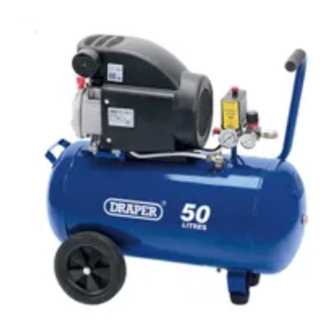Draper DA25/190 Manuel d'instructions - Page 10
Parcourez en ligne ou téléchargez le pdf Manuel d'instructions pour {nom_de_la_catégorie} Draper DA25/190. Draper DA25/190 16 pages. 25 & 50 litre compressors

In order to keep your compressor in good
working conditions, we recommend you to
perform periodical servicing operations.
Before performing any maintenance
operation, switch off the compressor and
ensure all air in the tank is released.
OPERATIONS TO BE CARRIED OUT
AFTER THE FIRST 50 WORKING HOURS:
Check that all screws are properly tight,
paying special care to the head and crank
case. Replace the lubricant with one of the
recommended oil listed (page 10).
Never mix different oils together. Do not
use non-detergent oils or low quality oils
as they have very poor lubricating
properties.
Do not pour out oil in the environment.
Always contact your local body in charge
of the collection.
WEEKLY OPERATIONS:
Check the oil level and if necessary top up.
Do not exceed the mark corresponding to the
max. level. Make sure the oil does not drop
below the minimum so as to avoid any
damage or seizure.
Drain condensation, while the tank is
pressurised by opening the valve (I) located
under the tank. Open the valve by turning it
anti-clockwise (Fig.8) with a container under
the valve. Keep the compressor in a position
to allow all condensation to flow out
completely.
MONTHLY OPERATIONS (OR MORE
FREQUENTLY IF THE COMPRESSOR
OPERATES IN VERY DUSTY AREAS) (Fig.9):
Remove the suction filter (J) and replace or
clean the filtering component. Do not operate
the compressor without the suction filter
fitted, as foreign bodies or dust could
seriously damage the inside components.
OPERATIONS TO BE CARRIED OUT
EVERY 6 MONTHS (Fig.10):
Pull out the oil dipstick and loosen the bolt
(K) to change the oil. Collect the oil into a
suitable container.
You should perform this operation when the
compressor is hot so as to allow the oil to
drain rapidly and completely. Tighten the bolt
(K) and pour in the new oil up to the max.
level and no higher.
MAINTENANCE
(I)
Fig.9.
Fig.10.
(K)
- 9 -
Fig.8.
(J)
